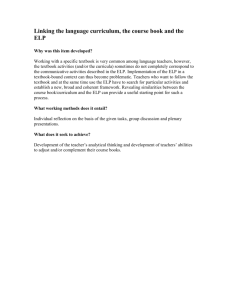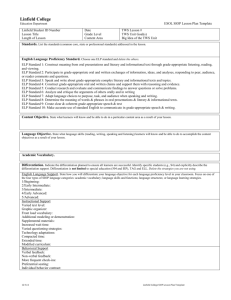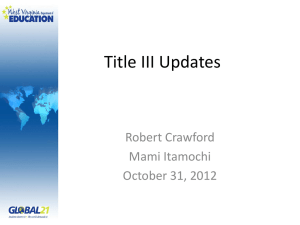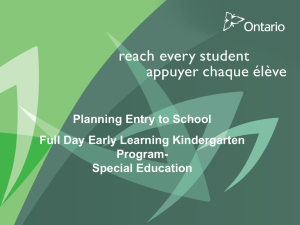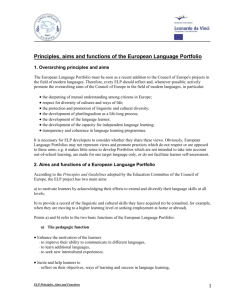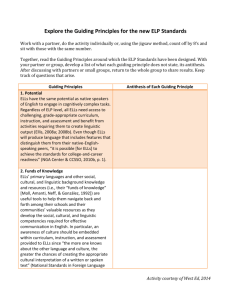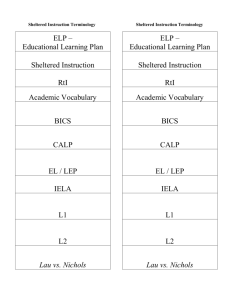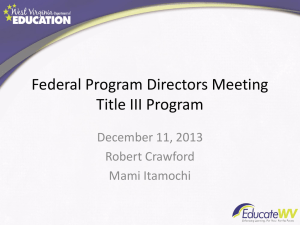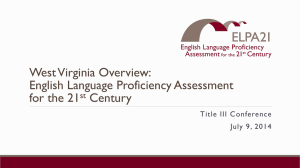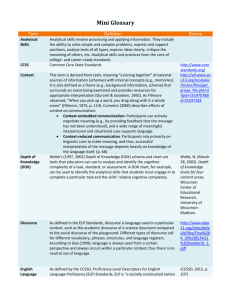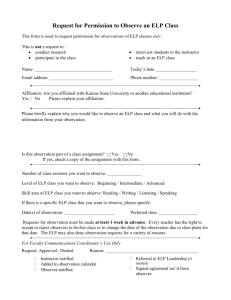PowerPoint - WV Connections
advertisement
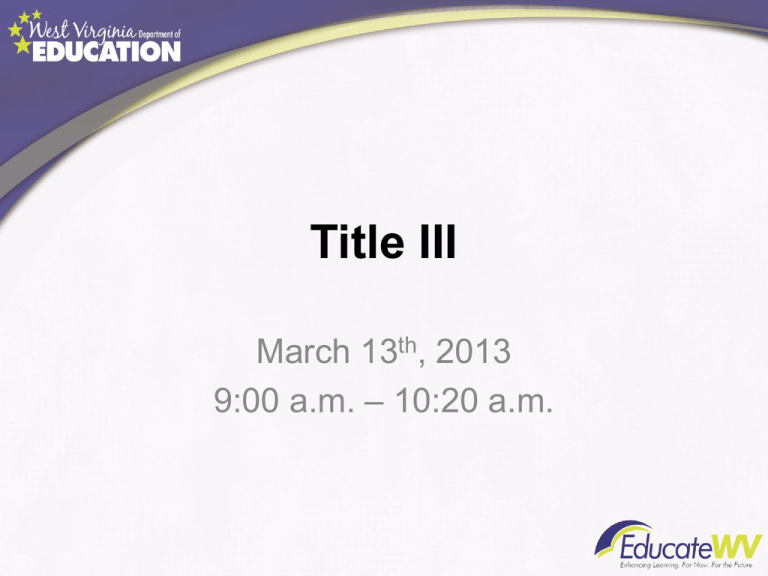
Title III March 13th, 2013 9:00 a.m. – 10:20 a.m. Outline • Program Updates • ESEA Flexibility Waiver & English Language Learners • Making the Common Core Standards Accessible to English Language Learners Program Updates • • • • ESL Cohort WVEIS WESTELL Common Core – E-Learning – ELP Standards – Resource Program Update 1 • 2013 WVDE MU ESL Cohort – Application • Application deadline – 4/15/2013 • Each county can send 1 teacher • http://wvconnections.k12.wv.us/documents/TEACHERApplic ationESLCADRE2013FALL.doc – MU ESL program brochure http://wvconnections.k12.wv.us/documents/Brochure _EnglishasaSecondLanguage-February2013.pdf – Informational Elluminate session 3/28 at 3:30 p.m. https://sas.elluminate.com/m.jnlp?sid=2011679&pass word=M.D6BAA553B951519F332AD7177021C2 Program Update 2 • WVEIS – WOW LEP Screen • Report • Caution – Immigrant Children’s Information • Basic Screen Program Update 3 • ALL LEP students must take WESTELL test • Important Dates – – – – March 11-13 March 18 - April 26 May 3 May 20 May 24 – June 28 – August 16 WESTELL Materials Arrive Testing Window All Materials Return to MI Review and Correct Student Demographic Information WESTELL Reports Issued Last Day for Review Score Report Program Update 4 • Common Core – E-learning – ELP Standards (Common Definition) – Resource http://media.all4ed.org/webinar-feb-26-2013 ESEA Flexibility Waiver & English Language Learners Principle 1: Assurances • It will adopt English language proficiency (ELP) standards that correspond to the State’s college- and career-ready standards, consistent with the requirement in ESEA section 3113(b)(2), and that reflect the academic language skills necessary to access and meet the new college- and career-ready standards, no later than the 2013–2014 school year. (Principle 1) Principle 1: Assurances • SEA will develop and administer ELP assessments aligned with the State’s ELP standards, consistent with the requirements in ESEA sections 1111(b)(7), 3113(b)(2), and 3122(a)(3)(A)(ii). Principle 1: ELP Standards • Revise WV Policy 2417: English Language Proficiency Standards and Objectives for West Virginia Schools • Framework for English Language Proficiency Development Standards corresponding to the Common Core State Standards and the Next Generation Science Standards Principle 1: ELP Standards • English Language Proficiency Assessment for the 21st Century (ELPA21) consortium of 10 states: Arkansas, Florida, Kansas, Iowa, Louisiana, Ohio, Oregon, South Carolina, Washington and West Virginia • Partners: Council of Chief State Schools Officers (CCSSO), Understanding Language Initiative at Stanford University and WestED Comprehensive Center Principle 1: ELP Standards Principle 1: ELP Standards Timeline • Draft Shared with ELPA 21 consortium states in Spring of 2013 • WVDE convene group in late spring/early summer to provide initial input • ELPA 21 finalize by late summer • WVDE convene group in late summer/early fall to develop into WV framework and Policy 2417 • WVBE in fall and full approval by December 2013/January 2014 Principle 1: ELP Assessment • ELPA 21 Consortium Development • consortium diagnostic screener • Summative English language proficiency assessment in grades K-12 • Employ technology when possible and account for interoperability across user platforms emerging from Smarter Balanced and PARCC. Principle 1: ELP Assessment Timeline • Consortium Governance Formation: Spring 2013 • Vendor Round Table: May 2013 • RFP Release: June – September 2013 • Proposal Reviews: July – December 2013 • Vendor Contracting: January 2014 • Assessment Implementation: 2016 -2017 Principle 1: Providing Supports for English Language Learners 1. Build capacity to develop ELLs’ academic language in content-area classrooms. 2. Provide ELLs with multiple pathways for acquiring grade-level content knowledge and skills. 3. Develop valid and reliable content-area assessments for ELLs 4. Ensure that content-area teachers are well prepared and collaborate to support the success of ELLs http://www.air.org/files/ELL_Pocket_Guide1.pdf Principle 2: Differentiated Recognition, Accountability and Support Systems • Student achievement in reading/language arts and mathematics for all students and all subgroups of students • Graduation rates for all students and all subgroups • School performance and progress over time, including the performance and progress of all subgroups Principle 2: Recognition & Support Principle 2: Focus Schools • Plans are extended (strategic plan & ESEA plan) to address subgroup targets • TA provided by FAST groups at the LEA, RESA & WVDE • Specific funding opportunities based on availability • Interventions consistent with approved best practices menu • Progress accountability outlined in MOU and reviewed annually by the LEA & local board FAST Focus Assistance Support Teams State FAST may include: RESA FAST may include: LEA FAST may include: • • • • • • • • • • • • • • • Federal Programs Optional Pathways School Improvement Special Programs Professional Development Special Education Director TA Support Specialists Wellness Specialists Superintendents Attendance Directors Curriculum Director Test Coordinator Federal Program Staff Special Education Director other Principle 2: Focus Menu of Interventions • • • • • • • • • Scaffolding Vocabulary Differentiated Instruction Early Warning System Building Prior Knowledge Emphasizing Critical Information Formative Assessment Scientifically-based Models Progress Monitoring Principle 2: Transition Schools • Plans are targeted (strategic plan & ESEA plan) for meeting AMO targets • TA & Interventions are school determined & supported by the LEA • Progress accountability/review are established by the LEA Principle 3: Effective Instruction and Leadership Will implement teacher and principal evaluation systems that: • Will be used for continual improvement of instruction • Use multiple valid measures in determining the performance levels, including as a significant factor data on student growth for all students (including English Learners and students with disabilities), and other measures of professional practice Principle 3: Effective Instruction and Leadership 1. Assist teachers in developing meaningful student learner goals 2. Develop exemplars of teaching practice at different levels of teaching proficiency to guide evaluators in evaluating effective teaching practices. 3. Connect evaluation standards and teacher preparation programs Share with a Partner • How will the waiver impact my current work in supporting English language learners? • What aspects or infrastructural components are already in place? • What will be the greatest challenges? • What is one tangible action step I will take upon returning to the county? Making the Common Core Standards Accessible to English Language Learners Understanding Language http://ell.stanford.edu/teaching_resources/ela Questions?? Robert Crawford rcrawford@access.k12.wv.us Mami Itamochi mitamochi@access.k12.wv.us 304-558-0200
